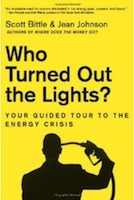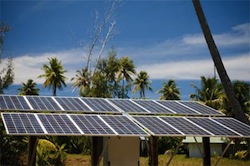 Should we be entertained when reading about America’s energy crisis? Dare we be regaled by clever cliches, fun word pairings and sarcasm when learning our basic Energy 101 facts? Yes to infinity. And I experienced just these things when reading “Who Turned Out the Lights?” by Scott Bittle and Jean Johnson. Reading this book was a guilty pleasure because I enjoyed the lighthearted book just a bit too much when technically the topic of energy, tends to be, well, a bit dull.
Should we be entertained when reading about America’s energy crisis? Dare we be regaled by clever cliches, fun word pairings and sarcasm when learning our basic Energy 101 facts? Yes to infinity. And I experienced just these things when reading “Who Turned Out the Lights?” by Scott Bittle and Jean Johnson. Reading this book was a guilty pleasure because I enjoyed the lighthearted book just a bit too much when technically the topic of energy, tends to be, well, a bit dull.
The book was a “guided tour” through the country’s energy crisis. Beginning with reasons why the U.S. needs to get its act together, the book chronicles the country’s failed attempts at energy security and diversity, discussed three flawed ideas that could get the country off track, and laid out 10 facts all people should know about energy. Did you know that one out of four Americans can’t name a fossil fuel? Yikes.
The tour then takes you through a discussion of various types of energy and alternative energy sources. While this section was good, the book was published in 2009 so some of the information was outdated so reader, digest this will a sprinkle of salt. For example, in the section about ethanol (a biofuel that surprisingly the authors don’t hate) they mentioned subsidies and the tariff on Brazilian ethanol (neither of which still exist).
However, there was one element of this section that really stood out. Many argue that the low hanging solution is to improve fuel economy and some go so far to declare that this has been accomplished. While on the outside, yes, this is correct, on the inside, it is not actually the case. As Bittle and Johnson aptly point out, when fuel economy gets better, people drive more. So at the end of the day, actual fuel consumption doesn’t actually go down, it remains virtually the same.
There were other areas this book addressed, and explained well, that other books have not.  The book identified correctly, I believe, that Americans are energy illiterate. I hypothesize (and some day I hope to prove out) that the more energy literate you are, aka the more you understand energy, the more you understand the need for energy security and alternative energy sources such as wind, solar, geothermal and biofuels. How can this crisis (yes, this country does not just have an energy crisis but an energy literacy crisis) be overcome? The answer: better education through science, technology, engineering and mathematics, or STEM. Our schools, point out the authors, do not graduate young adults who are prepared or interested in getting degrees in fields that will bring us new energy technologies.
The book identified correctly, I believe, that Americans are energy illiterate. I hypothesize (and some day I hope to prove out) that the more energy literate you are, aka the more you understand energy, the more you understand the need for energy security and alternative energy sources such as wind, solar, geothermal and biofuels. How can this crisis (yes, this country does not just have an energy crisis but an energy literacy crisis) be overcome? The answer: better education through science, technology, engineering and mathematics, or STEM. Our schools, point out the authors, do not graduate young adults who are prepared or interested in getting degrees in fields that will bring us new energy technologies.
The end of the tour brings us a play-by-play of various ideas that people have thrown out to solve the energy crisis. While the authors do not propose their own ideas, nor outright endorse any of them, they do provide the pros and cons of each solution so the reader can make an informed decision on what solutions he or she believe will “keep our lights on”. The next time you mumble as you’re paying your utility bill or paying for your fuel at the pump, get out your smart phone and order this book.
Win this book. Send me an email with the subject line “Who Turned Out the Lights,” include your contact information in the email and then check to see if you won in the December 19, DomesticFuel newsletter.

